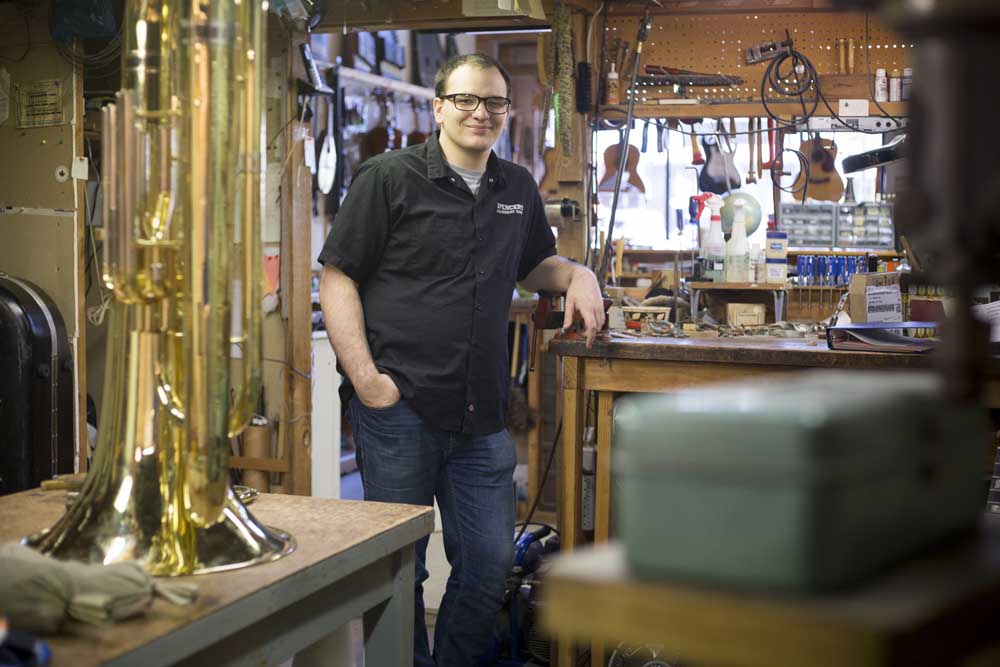Meet the Merchant Spencer Percy, owner, Spencer’s Instrument Repair
Published 6:58 am Wednesday, February 15, 2017

- Spencer Percey, 22, took over ownership of what was formerly Thompson's Instrument Repair in October 2015 following retirement of Roger Thompson. “Taking over a shop versus starting from the ground up, that was huge, more than I could ever ask for. He had a huge cliental. I still have people, after being here a year and a half, coming in and saying ‘You're not, Roger.'”
“Never in a million years.”
“I actually started off wanting to be a music teacher. And being huge into the local music community, I’ve been in bands and everything. With community bands, all the local music teachers are in those. I was walking with a couple of the local music teachers to one of the practices and we were talking about what we were going to do when the local repairman decides to retire. They looked at me (knowing I wanted to be a music teacher) and said, ‘You don’t want to be a music teacher.’ So I said ‘I’ll think about it. I figured, a whole bunch of different problems with all sorts of different instruments — how can I ever get bored?”
“It was nine months at Renton Technical College in their band instrument repair technology course. There are only three schools in the nation that have such a course.”
“The specific course I went to teaches the main five band instruments: flute, saxophone, clarinet, trumpet and trombone. They teach about the common problems with them — how to replace a pad, unstick a slide and fix a valve — how to diagnose what’s wrong with it.”
“It’s been interesting. There’s been ups and there’s been downs. The community has been hugely supportive. Taking over a shop versus starting from the ground up; that was huge, more than I could ever ask for. It was just huge, I already had the clientele. Roger Thompson (the former owner) had been in business for 40 years and retired at the age of 70. He had a huge clientele. I still have people, after being here a year and a half, coming in and saying ‘You’re not Roger.’”
“It was a Gibson (guitar). I don’t remember which model, but it was a nice one. It was a five-figure Gibson, I know that much. It was in for a pickup installation and fret replacements.”
“It’s not so much a repair, but people bringing in their guitars to be professionally restrung, because I do a bit more than just restringing. I shine up the frets as well as condition the fingerboard and the bridge. I oil them with bore oil and do a little more than just putting new strings on.”
“Ballpark for that is about $15.”
“Yes, unless you want to go for a string upgrade with Elixir Strings, which do last a lot longer because they have a Nanoweb or Polyweb coating.”
“What I personally like to work on, and what people say that I do wonders with, are flutes. People love my flute and brass work. I also really love working on brass, there’s just something about moving metal around. Flutes are my big forte.”
“One was for Astoria’s new music director. He brought his horn in and it had a very stuck slide. It was actually bent to the point to where I couldn’t repair it, so I had to do some rather interesting things for it. I had to actually make a slide for it since I couldn’t just order a new one. I had to get a little ‘ingenuitive’ with it and make it work how trombone slides work. That’s actually been my favorite.”
“I play saxophone mainly. I’ve been playing 12 years now. Flute is my self-proclaimed secondary instrument. String instruments I still have yet to get a grasp on. I know enough to make sure they work.”
“Something that people commonly forget about is keeping in mind the moisture and humidity, particularly with wooden instruments. Wooden instruments are what I consider living instruments. They’re constantly moving and shifting and with the humidity they will often crack. Another common mistake people make is leaving their strings full tension when they’re traveling which causes their (guitar) necks to warp. Also with new band students, putting music inside their instrument cases, which causes keys, valves and slides to bend.”
“The easiest to maintain are probably trumpets and trombones, just because you give them a bath once a month and bring them in to get chemically cleaned once a year. They’ll run for eternity if you keep them clean. As far as most difficult to maintain, it’s probably wooden instruments because you can’t prevent cracks. It’s not, ‘How do I stop cracks?’ It’s ‘When will it crack?’ It will crack at some point.”
“If you’re looking for brass instruments, I would say try trumpet or trombone. If you’re looking to just start out, buzz on the mouthpiece, you’ll know which one feels better for you. For woodwind, you can go with either flute or saxophone. Saxophone is easiest to learn because the fingerings the same upper octave as well as the lower octave.”
“Me being a saxophone person, I’ve looked into weird saxophones. There’s what’s called a contrabass saxophone. It’s a 6-foot tall saxophone. It’s ridiculous. I wish it was more common — there are only 60 in the world. The theremin is a pretty cool one, but now with technology, there are theremins on iPads. It’s kind of tough to get those unusual instruments back in the world.”





